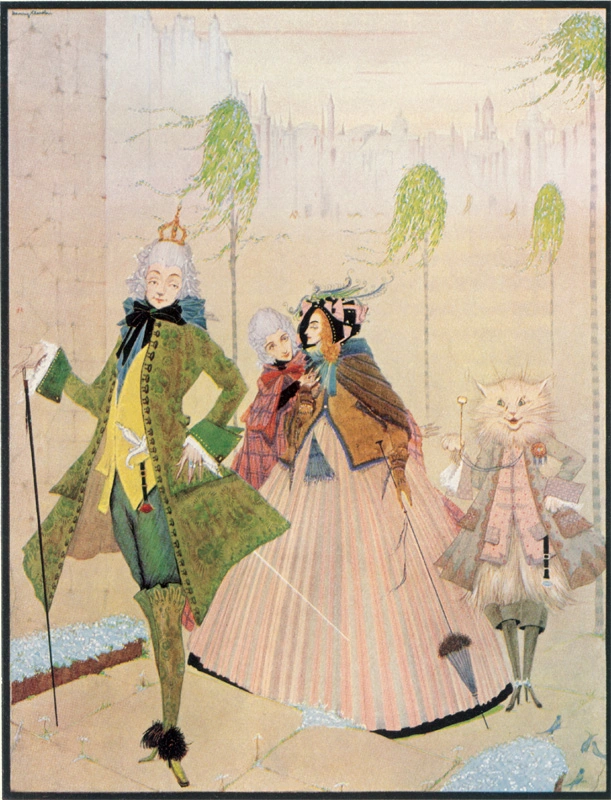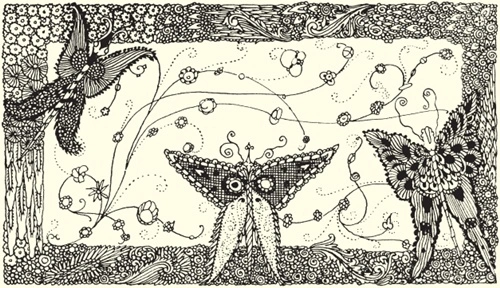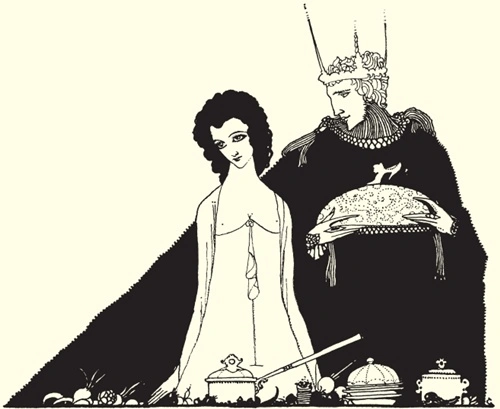He said to them, “Good people, you who are reaping, if you do not tell the king that all this corn belongs to my lord, the
Marquis of Carabas, you will all be chopped into mincemeat.”
The king, who drove by a moment later, asked to whom all the corn belonged.
“To my lord, the Marquis of Carabas,” replied the reapers, and the king again congratulated the marquis.

“THE MARQUIS GAVE HIS HAND TO THE PRINCESS, AND FOLLOWED THE KING, WHO WENT UP FIRST”
The cat, who always went on ahead, said the same thing to everyone he met, and the king was astonished at the vast estate of his lordship the Marquis of Carabas.
Mr Puss came at last to a stately castle, the master of which was an ogre, the richest ever known, for all the lands that the king had just driven through belonged to this castle. The cat, who
had made it his business to find out who this ogre was and what he could do, asked to speak to him, saying that he could not pass so near his castle without having the honour of paying his respects
to him.
The ogre received him as politely as an ogre could, and made him sit down.
“I have been assured,” said the cat, “that you have the gift of being able to change yourself into all sorts of creatures that you have a mind to. You can, for example,
transform yourself into a lion, or an elephant and suchlike.”
“This is true,” answered the ogre very briskly, “and to convince you, you will now see me become a lion.”
Puss was so terrified at the sight of a lion so near him that he jumped up into the gutter, not without a lot of difficulty and danger, because of his boots, which had not been designed for
walking on roof tiles.
A little while afterwards, when he saw that the ogre had resumed his natural form, Puss came down and admitted that he had been very frightened.
“I’ve also been told,” said the cat, “but I’m not sure that I can believe it, that you also have the power to take on the shape of the smallest animals, for
example, to change yourself into a rat or a mouse, but I must confess that I believe this to be impossible.”
“Impossible?” cried the ogre, “You will see it now!” And at the same time he changed into a mouse and began to run around the floor.
As soon as Puss saw this, he jumped on the mouse and ate him up.
Meanwhile, the king, who was passing this fine castle of the ogre’s, had a mind to go into it. Puss, who heard the noise of the coach running over the drawbridge, ran out and said to the
king, “Your Majesty is welcome to this castle of my lord, the Marquis of Carabas.”
“What! My Lord Marquis?” cried the king, “And does this castle also belong to you? There can be nothing finer than this court, and all the stately buildings surrounding it. Let
us go in, if you please.”
The marquis gave his hand to the princess, and followed the king, who went in first. They came into a spacious hall where they found a magnificent meal prepared by the ogre for his friends, who
were supposed to visit him that very day, but didn’t dare enter while the king was there. The king was perfectly charmed with all the good qualities of his lordship the Marquis of Carabas, as
was his daughter, who had fallen violently in love with the young man. Seeing the vast estate that he owned, the king said to him, after five or six glasses of wine, “It’s entirely up
to you, Marquis, if you want to be my son-in-law. If you want my daughter’s hand in marriage I will gladly grant it.”
The marquis, bowing low several times, accepted the honour conferred on him by the king, and married the princess that very same day.
Puss became a great lord, and ran after mice only as an amusement.

THE MORAL
How advantageous it may be
By long descent of pedigree,
T’enjoy a great estate,
Yet knowledge how to act, we see,
Join’d with consummate industry,
(Nor wonder ye thereat)
Doth often prove a greater boon,
As should be to young people known.
ANOTHER
If the son of a miller so soon gains the heart
Of a beautiful princess, and makes her impart
Sweet languishing glances, eyes melting for love,
It must be remark’d of fine clothes how they move,
And that youth, a good face, a good air, with good mien,
Are not always indifferent mediums to win
The love of the fair, and gently inspire
The flames of sweet passion, and tender desire.


CINDERELLA
There was once a gentleman whose second wife was the haughtiest and most snobbish woman who had ever lived. She had two daughters by a previous
husband, who took after her and were exactly like her in all things. Her husband, likewise, had a young daughter by his first wife, a girl who was unequalled in goodness and sweetness of temper, in
which she took after her mother, who had been the best creature in the world.
No sooner were the wedding celebrations over than the stepmother began to show her true colours. She could not bear the good qualities of her pretty stepdaughter, the more so because they made
her own daughters appear even worse. She kept her busy doing all the menial work in the house – she scoured the dishes, tables and floors and scrubbed her stepmother’s chamber and those
of her stepsisters. She went to bed in a horrible garret on a straw mattress, while her sisters had fine rooms with inlaid floors, and beds of the latest fashion. They had looking-glasses so large
that they could see themselves at their full length, from head to toe.
The poor girl put up with everything patiently, and dared not tell her father, who would have ignored her, for he was completely ruled by his wife. When she had done her work she used to go into
the chimney corner and sit among the cinders and ashes, which soon meant that she was called Cinderpants. However, the younger sister, who was not as rude as her older sister, called her
Cinderella. Despite her ragged clothes, Cinderella was 100 times more beautiful than her sisters, though they were always very richly dressed.
It happened that the king’s son gave a ball, and invited all the fashionable people to it. Our young ladies were also invited, for they cut a very fine figure among the quality. They were
mightily delighted at the invitation, and busied themselves choosing those gowns, skirts and headdresses that would suit them best. This was a new trouble for Cinderella, for it was she who looked
after her sisters’ clothes.
They talked all day long of nothing but what they would wear.
“For my part,” said the eldest, “I will wear my red velvet suit, with the French trimming.”
“And I,” said the youngest, “shall have only my usual skirt; but to make up for that I will wear my gold-flowered cape and my diamond bodice, which is not the most usual one in
the world.”
They sent for the best lady’s maid they could get, to do their hair and fix their headdresses, and they bought their make-up and beauty patches from the fashionable makers.
They also called on Cinderella to advise them in all these matters, for she had excellent ideas and always gave them good advice. She offered her services to do their hair, which they were very
willing to have her do. As she was doing this, they said to her,
“Cinderella, would you not like to go to the ball?”
“Oh,” she said, “you are mocking me. It is not for such as I to go there.”
“You’re right,” they replied, “it would make the people laugh to see a Cinderpants at a ball.”
Anyone other than Cinderella would have sabotaged their hairstyles, but she was very good, and did a perfect job. The sisters were so full of joyful anticipation that they didn’t eat for
almost two days. They broke more than a dozen laces in trying to have their corsets so tightly laced that they would have a fine slender shape, and they were constantly at their looking-glasses. At
last the happy day came – they went to court and Cinderella followed them with her eyes for as long as she could. As soon as they were out of sight she started to cry.
Her godmother, who saw her crying, asked her what was the matter.
“I wish I could . . .
1 comment